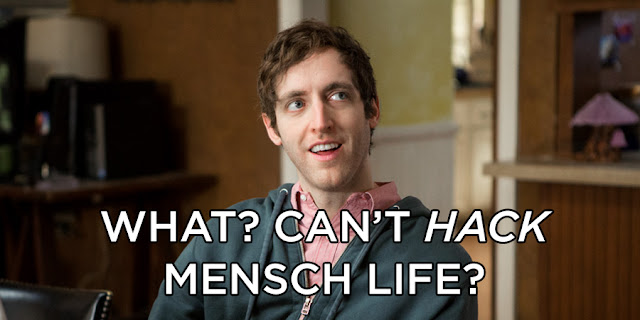 “Richard; do the right thing here -- [Dramatic Pause] -- lie on the stand,” says Erlich Bachman, part owner of tech startup Pied Piper, in this Sunday’s episode of the hit HBO comedy series Silicon Valley. This is Erlich’s under the circumstances “reasonable” advice to Richard just moments before he is called to the stand.
“Richard; do the right thing here -- [Dramatic Pause] -- lie on the stand,” says Erlich Bachman, part owner of tech startup Pied Piper, in this Sunday’s episode of the hit HBO comedy series Silicon Valley. This is Erlich’s under the circumstances “reasonable” advice to Richard just moments before he is called to the stand.Quick context for those who don’t watch: the evil tech giant Hooli has brought an absurd intellectual property lawsuit against protagonist Richard and his brilliant but floundering startup Pied Piper, in a low blow effort to tie them up in legal fees so they can beat Pied Piper’s much better app. Hooli really has no case, until the prosecution realizes that Richard did in fact make one tiny mistake, having used a Hooli company computer during his time there to perform some small and insignificant test for his app.
Hooli has no real proof. All Richard has to do is tell a little white lie on the stand. Most viewers watching Richard take the stand are probably praying he’ll take Erlich’s advice and just lie. We nervously watch and laugh as he awkwardly struggles through the prosecution’s line of questioning, and just when you think he might actually do the “right” thing in Silicon Valley speak - he does the Mensch thing instead. He admits to his one small mistake and gives the prosecution a real case.
“I just wanted to be different...but if this company is built on lies, then we’re really not that much different from Hooli. The law says that I lose everything - my whole company, everything that I worked for, because I used one Hooli computer to test and modify one block. Is that right? I mean, is that fair? To me, if the system says that’s fair, then I guess I’m probably not meant to be a part of it..."
This is the genuine and vulnerable speech Richard makes in one of the few sincere moments the show has ever had.
In the world of Silicon Valley - both in the show and real life - lying, cheating and doing whatever it takes to get ahead are not just a way of life - they are seemingly admirable moves. “Business is business” is a phrase we proudly use to justify otherwise unethical behavior. Sacrificing morality for monetary or personal gain has almost become an accepted aspect of the American dream. Why? Perhaps because it demonstrates our great ambition and our willingness to do anything to get ahead and even if deep down we know it’s wrong, since it’s become so accepted, it doesn’t seem quite as bad. Our protagonist Richard sticks out like a sore thumb in his world because he refuses to adopt this attitude. Time and again he does what he knows is right, even if it means sacrificing success and losing a short term battle for himself or his company.
But what about the bigger picture? What about on the soul level?
Just because we have become numb to our world’s “business is business” attitude doesn’t mean something else isn’t happening internally or to the development of our personality. Judaism teaches that every action we take, positive or negative, has a real and significant impact upon us. Whereas the French philosopher Rene Descartes believed: ”I think, therefore I am”. Judaism teaches “I act, therefore I am”. Ultimately we are the bi-products of our actions and behavior, whether we feel it or not. This is why classical Judaism is mitzvah-oriented - 613 do’s and dont’s - because although thoughts and beliefs are important, it’s ultimately what we do that develops us into who we become. This is why the bulk of Judaism’s mitzvot pertain, not simply to religious ritual, but to our everyday lives since that’s what forms us as people. The Torah therefore prescribes a certain diet (Kashrut), what is considered appropriate or inappropriate speech (lashon hara), laws pertaining to commercial dealings, modest dress (tzniut) and special sensitivity to the widow, stranger and orphan because the impact of the way we speak, eat, dress on our souls and on our personality is huge. The good news is that the good we do, whether known publicly or not, plays a tremendous role in our personal development. Back to our mensch of the hour - he may repeatedly make what society considers bad business moves -- but he is doing right by his soul and the universe at large.
One more difference: our lives are not a predictable 10 episode season scripted by other people. In real life, we write our own scripts and all we really know is that every action we take directly impacts the long-term narrative for our soul.
No comments:
Post a Comment